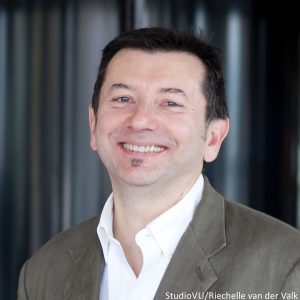
The Multimodal Communication and
Cognition Laboratory (PoliMod)
The Multimodal Communication and
Cognition Laboratory (PoliMod)
Founding director of the Lab: – Professor Alan Cienki, Ph.D. in Linguistics
About the founding director: Prof. Cienki received his PhD from Brown University (Providence, USA) in Slavic linguistics, focusing on comparative semantic analysis. During the years he worked at Emory University (Atlanta, USA) he expanded his research into cognitive linguistics, metaphor studies, and then the analysis of spoken language and gesture. He maintains a position as Professor of English Linguistics at the Vrije Universiteit (VU) in Amsterdam, Netherlands, where he has worked since 2006.
The Multimodal Communication and Cognition Laboratory was established at Moscow State Linguistic University in 2013 with the goal of researching face-to-face communication as not just verbal but also visual to varying degrees. Speakers integrate the use of hand gestures, head movements, eye gaze, etc. with their speech in complex ways, often without even being aware of it. These behaviors are increasingly being studied by linguists for their communicative role in relation to language. The Lab focuses on the interaction between such verbal and co-verbal behaviors in contexts of persuasive and other types of communication in different languages and cultures.
The spontaneous movements we make while talking reflect aspects of how we are formulating our ideas. In the Lab’s research, the theoretical framework of cognitive linguistics provides the basis for studying these processes of ‘thinking for speaking’. Analysis of how speakers use different frames, scripts, metaphors, metonymies, and cognitive/cultural models in their speech and gestures allows us to gain insight into processes of idea development in interaction with others. Detailed micro-analysis of video-recorded interactions provides a starting point for interpretive analysis of processes of sense-making and sense-giving in situ. In this regard, attention will also be given to how interactants respond to the use of various cognitive-rhetorical devices, e.g., whether they adopt or reject the use of the devices employed by the speaker, i.e., whether addressees align with speakers or not.
The starting point for our research is communication naturally produced in various professional settings, e.g., debates between politicians, sales pitches by entrepreneurs, trials in courtrooms, etc. Research on data from these contexts is of interest not only for the role that persuasive communication plays in them but also for the potential relevance that the research findings can have beyond academia in society more broadly, such as in communication advising.
Entrepreneur mentioning a list of entities, “products, opportunities, invoices, cash”, and representing them in a circle with his gesture – thus showing them as steps in a repeatable business cycle (Cornelissen, Clarke & Cienki 2012: 227).
Through its research projects, workshops, data analysis sessions, and reading groups, the Multimodal Lab provides training and research supervision to interested students, PhD candidates, post-docs, and staff members, including supervision of theses and dissertations. Research design, methods of data collection, and training in approaches to speech and gesture transcription and techniques for their analysis play a central role.
More broadly, the Lab aims to provide a connecting point for researchers in the Moscow area interested in multimodal communication in contexts of talk. The Lab also welcomes research collaborations with colleagues abroad. PhD candidates, postdocs, and senior scholars who can provide their own funding for research visits to the Lab are invited to contact the Director.


